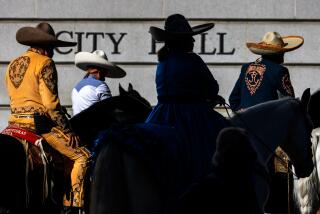Marwah’s Residency Status Still Unsolved : Government: Mayor Bradley asked city attorney five months ago if cultural heritage commissioner fulfilled requirements. Issue is ‘like a slippery eel,’ official says.
- Share via
Whether Cultural Heritage Commissioner Amarjit S. Marwah meets the residency requirements to be a city commissioner remains an unresolved question, five months after Mayor Tom Bradley asked the city attorney to explore the matter.
The 64-year-old dentist, one of Bradley’s largest campaign contributors, has for more than 20 years owned a 10-acre complex along Pacific Coast Highway in Malibu, which until its recent vote for cityhood was an unincorporated section of Los Angeles County.
The Los Angeles Administrative Code requires that members of the Cultural Heritage Commission, like most city commissions, reside in the city of Los Angeles.
Claude Hilker, the city attorney senior counsel assigned to prepare an opinion on Marwah’s residency, said he has been too busy to do so: “Other things just keep taking higher priorities.
“This is sitting in a folder on my desk,” Hilker said. “If you could guarantee me I had one or two days to put it together without being interrupted, I can write up the whole thing.”
The Marwah matter came to light last January when The Times reported he appeared to live in Malibu. At that time, Marwah said he met the residency requirement because he spent his weeknights with friends in Baldwin Hills, which is within the city of Los Angeles, and only went to the Malibu home, where his wife lives, on weekends. He also said he was registered to vote from his Los Angeles office.
According to the California Election Code, however, it is illegal to register to vote from a place of business or in a city where you do not reside. Since then, Marwah changed his registration to his friends’ Baldwin Hills home.
Since then, Bradley spokesman Bill Chandler said, “We have pressed the city attorney’s office for an answer a number of times . . . and each time we have been advised they had not addressed this issue as yet.”
Hilker said Marwah’s case “turned out to be a heck of a lot more research factually and legally than I’d ever anticipated” and that the residency issue in general was “like a slippery eel.”
A person could live in more than one place and still meet a residency requirement, Hilker said. “Residency to a large extent is a matter of intent,” Hilker added.
Two years ago, the question of intent was the basis of a favorable city attorney’s opinion on the residency status of Harbor Commissioner Robert G. Rados Sr. He was then living much of the year--and still does--at his late mother’s home in Rancho Palos Verdes, outside the city, and the rest in San Pedro, a part of Los Angeles, where he owns a home.
The residence of a city commissioner must meet the California Elections Code’s definition of a “domicile” used for voter registration, according to the city attorney. That code says that even if a person has several residences, only the one where the person intends to live permanently can be considered a “domicile.”
Rados’ San Pedro home met that requirement, the city attorney’s written opinion said, because the commissioner had put the Rancho Palos Verdes house up for sale in 1986, and “Commissioner Rados intends to return permanently to San Pedro as soon as the property is sold.” It is still for sale, Rados said this week.
Spokeswomen for the county registrar and the secretary of state would not say whether Marwah’s friends’ home met the definition of a “domicile.” “It’s all contingent on the intention of the voter,” said Melissa Warren, spokeswoman for the secretary of state.
The heritage commission designates the properties given city landmark status. Marwah has been its chairman since 1985. He said Friday he had no comment on the issue of his residency.
More to Read
Sign up for Essential California
The most important California stories and recommendations in your inbox every morning.
You may occasionally receive promotional content from the Los Angeles Times.












